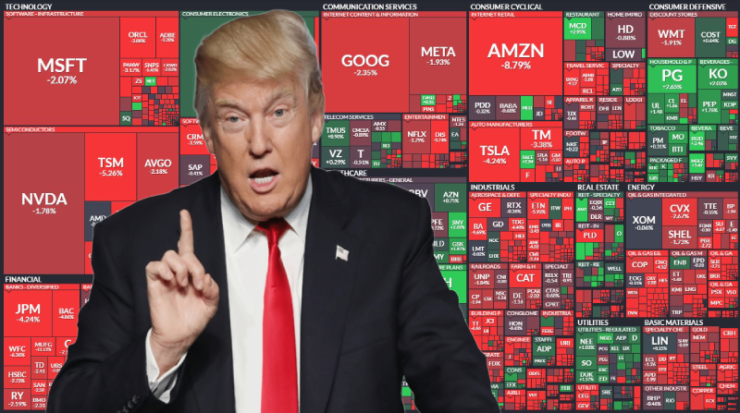Bitcoin’s sharp decline has raised concerns about the effectiveness of President Donald Trump’s pro-crypto policies. Despite his administration’s push to position the U.S. as a leader in digital assets, the crypto market continues to sink.
Bitcoin fell below $78,000 on Monday, marking a steep 28% decline from its January peak of over $109,000. Other major cryptocurrencies, including Ethereum (ETH) and XRP, also suffered losses, while crypto exchange Coinbase (COIN) saw its stock plummet more than 17%.
Trump’s early embrace of cryptocurrency initially fueled optimism in the sector. His election victory in November sent digital asset prices surging on expectations of a more favorable regulatory environment. The administration’s announcement of a national Bitcoin reserve last week was intended to reinforce that support. However, the market’s response has been underwhelming.
Market Reacts to Disappointment Over Bitcoin Reserve
The White House’s decision to establish a strategic Bitcoin reserve was one of Trump’s most significant pledges to the crypto industry. However, the details of the plan left many investors dissatisfied. Instead of purchasing new Bitcoin, the administration confirmed that the reserve would consist solely of assets seized in legal proceedings.
“The market reaction reflects a reset in expectations,”
said Haider Rafique, chief marketing officer at crypto exchange OKX.
“While formalizing a Bitcoin reserve is a milestone, it doesn’t create immediate buying pressure, disappointing those expecting aggressive accumulation.”
David Sacks, Trump’s appointed “crypto czar,” stated that the government currently holds approximately 200,000 bitcoins—valued at over $17 billion—but confirmed there were no plans to expand the reserve beyond seized assets.
“It is like a digital Fort Knox,” Sacks said, emphasizing that the government would not sell its holdings. However, the lack of a clear strategy for acquiring additional Bitcoin has left some industry leaders questioning the long-term impact of the initiative.
Macroeconomic Fears Compound Crypto Sell-Off
Beyond the disappointment surrounding Trump’s Bitcoin reserve, broader macroeconomic concerns are weighing on the cryptocurrency market. Investors are increasingly wary of Trump’s trade policies, particularly his decision to impose tariffs on Canada, China, and Mexico. These moves have fueled recession fears and triggered sell-offs across riskier asset classes, including digital currencies.
Goldman Sachs raised its recession probability estimate from 15% to 20% last week, citing the economic strain caused by the new tariffs. When Fox News asked whether the country could face a recession this year, Trump refused to rule out the possibility.
“There is a period of transition,” he said, adding that “it takes a little time” for economic policies to take effect.
JP Richardson, CEO of cryptocurrency wallet platform Exodus, acknowledged the recent turbulence but remained optimistic.
“Those of us that are in the industry remain hyper bullish,” he said. “I’m trying to buy as much Bitcoin as I can right now.”
Still, the market’s sharp decline suggests that most investors remain unconvinced.
Crypto’s Struggles Mirror Equity Market Declines
Bitcoin’s downturn is not occurring in isolation. Crypto stocks, including Coinbase, have suffered major losses, mirroring declines in the broader equity market. According to Jeff Dorman, chief investment officer at crypto asset manager Arca, the latest sell-off is driven primarily by macroeconomic factors.
“While the early parts of the crypto sell-off in January and early February had nothing to do with the global macro picture, the last two weeks have 100% been driven by the equity market tantrum,”
Dorman wrote in a Monday note.
Ethereum, XRP, and Solana have all posted significant declines, with Solana dropping nearly 8% on Monday. Cardano fared even worse, shedding 7% daily and 31% over the past five days. The losses underscore the growing pressure on digital assets as investors flee riskier markets.
White House Crypto Summit Yields Mixed Reactions
Last Friday, Trump’s crypto summit at the White House was meant to reassure industry leaders about his administration’s commitment to digital assets. The event brought together executives, including Richardson, to discuss future policy measures. Trump used the gathering to reinforce his pro-Bitcoin stance.
“From this day on, America will follow the rule that every bitcoin knows very well: Never sell your Bitcoin,”
Trump told attendees. He also reiterated his long-term vision of making the U.S. the “crypto capital of the planet.”
Despite the rhetoric, the summit did little to stem the market’s decline. Investors had hoped for more concrete policy commitments, such as direct government purchases of Bitcoin or additional regulatory clarity. Instead, the administration’s stance on future acquisitions remains uncertain.
Treasury Secretary Scott Bessent hinted that the government may explore acquiring additional Bitcoin, but stressed that any such efforts would need to be “budget-neutral.”
Coinbase CEO Brian Armstrong believes Trump’s Bitcoin reserve announcement could have long-term geopolitical implications.
“The United States government is now a holder of Bitcoin, maybe a buyer,” Armstrong said. “The rest of the G20 [countries] are going to see that as a signal that Bitcoin is really the successor to the gold standard.”
Investors are closely watching the administration’s next moves with the market in turmoil and recession fears looming. For now, Trump’s crypto-friendly policies have yet to deliver the market boost many had hoped for.





